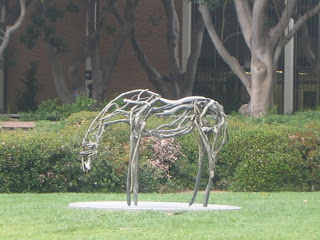reports from the field
Another lovely day at the Festival of Books...

Tod Goldberg moderated this panel inspired by the Inlandia anthology, which includes Tod and the other three panelists: Susan Straight, Michael Jaime-Becerra, and Gayle Brandeis. Some of the topics discussed were the changing environment around the peace movement, Darby Crash, secretive mother-in-laws, tract homes (natch), National Novel Writing Month, self-storage auctions, folk art dinosaurs, bad air (natch), the Salton Sea, parrots, the evil god of Tahquitz Canyon, the nudist colonies of Riverside, summer homes of the KKK, citrus groves (natch), Hell's Angels, White Front, and Trafficula. The mythologies around the Inland Empire are still being formed (and certainly, not enough has been made of its designation as an empire), so the panel (and presumably the anthology) have begun the discussion as a survey with the analysis sure to follow as the genre develops.
Favorite quote:
"The wind blows; that's sex." (Susan Straight discussing The Sex Life of the Date)
I wandered around a bit before attending the conversation between David L. Ulin and Jane Smiley. I am somewhat embarrassed to say that I've never read a single book by Ms. Smiley, but I am intrigued by her latest - Ten Days in the Hills - a contribution to my growing bookshelves of contemporary LA fiction. For that reason alone, I am likely to read it, but I will now make it a priority because I was impressed and entertained by almost everything Ms. Smiley had to say (and that Ulin's no slouch). Topics discussed included the Decameron (to be expected considering Ten Days is structurally based on Boccaccio's classic) and the lesser known Heptameron, the idea of writing overtly about sex as a political statement, the idea of being apolitical as a political statement, exchanging structure for plot as organizational framework, the finger of the plot in one's back, Robinson Crusoe, confessions of hanged men, empathy, chick lit, paperback originals, dating yourself through topical subjects, Zola's The Ladies' Paradise, fiction after September 11, and whether the administration's reaction to Hurricane Katrina would have been different if they had read Their Eyes Were Watching God.
Favorite quote:
Jane Smiley: "[Sex] sells papers."
David Ulin: "Something has to."
I left a bit early to get over to the purported smackdown panel, Litblogs: Words Online, once again moderated by Tod Goldberg. Andrew Keen has seemingly enraged the blogging community with his forthcoming polemic, The Cult of the Amateur: How Today's Internet Is Killing Our Culture. Keen was in attendance, and litbloggers Carolyn Kellogg and Ron Hogan rounded out the discussion. Work obligations prevent me from doing this panel justice at this time, so thoughts will follow tomorrow.
The audience was full of local bloggers, and while I missed Callie (do you look like your photo?), I had the chance to chat with Carolyn at the Book Soup booth later. You can read her report of the panel here.
The rest of the day involved a surprisingly delicious chicken caesar wrap with a friend, spending way too much money, running into random acquaintances, and starting the countdown of another 51 weeks until the next Festival of Books.



















